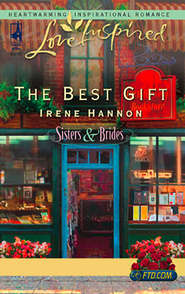По всем вопросам обращайтесь на: info@litportal.ru
(©) 2003-2025.
✖
Child of Grace
Автор
Год написания книги
2018
Настройки чтения
Размер шрифта
Высота строк
Поля
“Maybe I shouldn’t have talked you into letting me rent half your space for my shop. You’ve had to turn customers away at Tea for Two ever since I moved in.”
“Don’t be silly. It was a fine idea. This place was way too big for me.” She dropped her voice to a conspiratorial whisper and leaned closer. “I’m seventy-five years old, Kelsey, even if I don’t look a day over sixty-five.” With a wink, she straightened. “I’d have retired if you hadn’t made me that offer. This lets me keep my finger in the business without as much pressure. Serving a light lunch to fifty is a lot easier than dealing with two or three times that many people. This has worked out well for both of us.”
“I know I’ve benefited. I get perks like this.” She lifted her cup. “I’m not sure what you get out of the deal.”
“Companionship.” The older woman’s usual sunny expression dimmed a few watts. “I surely do miss your grandmother. She used to drive into Douglas for a visit almost every afternoon. I looked forward to our chats—even if she did insist I serve her tea in a mug.” An affectionate smile tugged at the older woman’s lips.
In the silence that followed, Kelsey took a sip of the herbal tea from her china cup. How Dorothy and her grandmother had ever connected was beyond her. They’d been as different as two women could be. Dorothy wore silk, cherished tradition and liked order. Bess Anderson had favored jeans, loved to experiment with new ideas and thrived in chaos.
But they’d shared common values, lively intellects and kind hearts. Apparently that had been enough to seal their friendship for more than forty years.
“Gram was one of a kind, wasn’t she?” The words came out choked, and Kelsey set the cup back on the saucer.
“That she was.” Dorothy patted her arm, then straightened her own shoulders. “And she wouldn’t want us to be moping around on her behalf. I never did meet a person who could wring more joy out of a day than Bess Anderson. I expect she’d be disappointed if we didn’t follow her example.”
“I agree. It’s just harder some days than others to do that.”
Dorothy gave her a keen look. “Any particular reason why it’s harder today?”
Kelsey lifted one shoulder. “I haven’t slept very well the past two nights.”
The older woman wrinkled her brow. “Bad dreams again?”
“Yes.” Dorothy was one of the few people who knew Kelsey’s story. Her grandmother’s never-married best friend had always been like a cherished great-aunt, and since Kelsey had moved to Michigan, Dorothy had done her best to fill the role vacated by Gram.
“How odd. You’ve been doing so well. Did something trigger them?”
“Not something. Someone. My new neighbor. A man in his thirties who’s staying at the Lewis house. Alone, as far as I can tell.” She traced the delicate gold-edged rim of the saucer with a fingertip. “He came up behind me on the beach Saturday.”
“Oh, my.” Distress tightened Dorothy’s features. “I can see how that would have been upsetting.”
“To make matters worse, I dropped a book while I was down there, and when he came by to return it I was changing a lightbulb on the porch. I was so startled I fell into his arms. Literally. I almost hyperventilated.”
The bell over the front door jingled, announcing the arrival of tearoom customers, and Dorothy called out to the two women who entered. “I’ll be right with you.” Then she leaned closer to Kelsey and lowered her voice. “Maybe you should talk to Dr. Walters again.”
“Maybe.” She’d made weekly trips to the therapist in Holland during her first six weeks in Michigan, but her visits had tapered off as the nightmares grew less and less frequent. She hadn’t been to see the woman in more than two months.
Now the nightmares were back. Thanks to Luke Turner.
As Dorothy seated her luncheon guests on the other side of the building, Kelsey forced herself to focus on more pleasant thoughts. Nibbling at a blueberry scone, she examined the row of quilts, displayed on large racks, that separated Tea for Two from Not Your Grandmother’s Quilts in the high-ceilinged space they shared. The two in the middle were Gram’s, and they were stunning. Creative, contemporary and abstract, they were pieces of art—and not at all what most people pictured when they heard the word quilt.
The ones on either end were hers. One was a commissioned piece she’d finished a couple of weeks ago and would soon be shipping off to the buyer. The other—an intricate, modernistic, three-dimensional design—wasn’t for sale. Gram had praised it highly, calling it a breakout piece when Kelsey had sent her a photo of it last year. It had taken her three years to make, squeezing in a few minutes of work on it here and there. As she’d discovered, climbing the corporate ladder left little time or energy for anything else, including artistic pursuits. In fact, after finishing that piece she’d considered setting aside her beloved pastime for the indefinite future.
Yet now she was making quilts full-time.
It was surreal.
The baby kicked, and Kelsey placed a hand on her stomach—awed by the flutter of new life within her, even as it evoked traumatic memories.
It was a dichotomy she had yet to reconcile.
Her phone rang, and she swiveled back to her desk to answer it. As she picked up the receiver and prepared to switch gears, the baby kicked again.
Reminding her that the momentous decision she’d been struggling with couldn’t be deferred much longer.
Luke pulled into a parking space in front of the St. Francis rectory in Saugatuck, picked up his briefcase and stepped out of the car. The small adjacent church looked just as Carlos had described it—traditional in design, with elongated panels of stained glass on each side and a steeple that soared toward the blue sky.
This was where the medical corpsman had turned his life around.
This was where he’d hoped to return and make a difference in the lives of other young people.
This was where his funeral had been held two short months ago.
Luke swallowed past the lump in his throat, forcing back a surge of emotion. The time for tears was past. He was here to look to the future. To do his part to fulfill a young man’s dream. To keep a promise.
With one more look at the soaring steeple, he strode toward the door of the rectory and pressed the bell.
Thirty seconds later, a middle-aged man dressed in black and wearing a clerical collar answered. His smile created a fan of wrinkles at the corner of each eye as he stuck out his hand.
“Captain Turner, I presume. Or do you prefer Doctor?”
“Luke is fine. Father Reynolds?”
“Make it Father Joe. Come in, come in. I’ve been looking forward to your visit. Everyone is here, eagerly waiting to meet you.” He closed the door and led the way down the hall. “May I offer you a beverage?”
“Coffee would be good, if you have it.”
“Always.” The man grinned and veered to his left at a T in the hall, leading Luke into a small, homey kitchen. He headed straight for the coffeepot on the counter, pulled a mug off a hook and filled it. “There’s a carafe of coffee and disposable cups in the conference room, but the guest of honor deserves the real thing.” He lifted the ceramic mug. “Do you take cream or sugar?”
“I like it black.”
“So do I.” The clergyman handed him the coffee and retraced his steps, continuing past the T. “We rotate our meetings among participating churches, and it happened to be my turn. Appropriate, since this was Carlos’s church.”
A few seconds later, the man ushered him into a small conference room dominated by a large rectangular table. Six people of various ages sat around it. As he entered, their conversation ceased and they all looked toward him.
“My fellow clerics, our guest of honor has arrived.”
As Father Joe went through the introductions and Luke shook hands with each of the board members, he did his best to file away their names.
Once the formalities were finished, Father Joe gestured Luke toward the seat at the end of the table, then took his place at the other end.
“First, on behalf of the Greater Saugatuck Interdenominational Youth Fellowship, I want to thank you for initiating this project and for making such a personal investment in it. Your willingness to devote a significant amount of time to the planning and organizing has impressed all of us.” Father Joe beamed at him.
Heat rose on Luke’s neck, and he shifted in his seat. “I appreciate your kind words, Father, but my sacrifice is small in comparison to Carlos’s. I’m giving time. He gave his life.”
“Yes. Saving others. ‘No greater love…’” The priest grew somber and folded his hands on the table. “Before we begin, shall we join our hearts in prayer?”
As they bowed their heads, the pastor spoke. “Father, we thank You for giving us the opportunity to gather here as Your family. Like all families, we are diverse. And we don’t always agree. But You have opened our hearts and minds to allow us to seek our commonalities, and to unify behind the shared goal of supporting our youth and helping them grow in faith.











